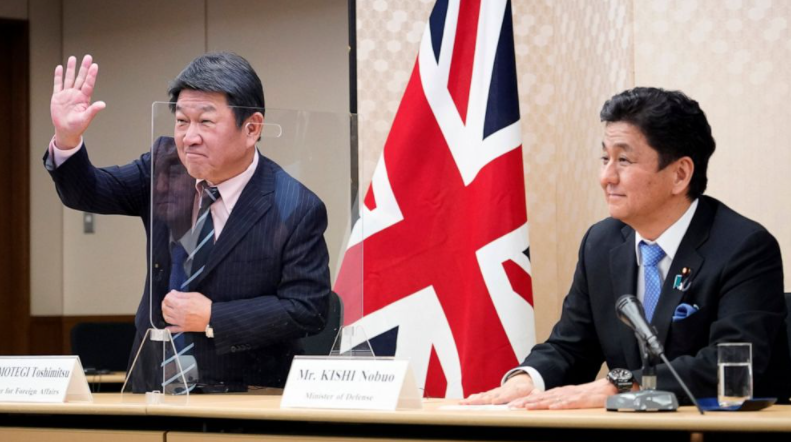Japan, UK concerned about China maritime law
The two countries see China’s escalating influence and military activity in the region as a security threat.
Four ministers from Japan and the UK have expressed serious concern over China’s newly-enacted Coast Guard Law that is implicit to change the status quo in the South China Sea and East China Sea.
| Japan's Foreign Minister Toshimitsu Motegi, left, and Defense Minister Nobuo Kishi attend a video conference with their British counterparts. Photo: AP |
Foreign Minister Toshimitsu Motegi and Defence Minister Nobuo Kishi of Japan, and their respective British counterparts Dominic Raab and Ben Wallace showed their concern in the joint statement released on February 3 after an online meeting, reported Reuters.
“The four ministers reaffirmed the importance of upholding freedom of navigation and overflight above the South China Sea and urged all parties to exercise self-restraint and refrain from activities likely to raise tensions,” the statement said.
According to AP, Foreign Minister Toshimitsu Motegi said in online talks between the two sides “Japan is staying alert and paying close attention to its effect on us.” “I believe the law should not be used in a way that violates international law.”
The concern came two days after the China’s Coast Guard Law took effect. The law enables Chinese Coast Guard to “take all necessary measures, including the use of weapons, when national sovereignty, sovereign rights, and jurisdiction are being illegally infringed upon by foreign organizations or individuals at sea.”
It means that the law explicitly allows the coast guard to fire on foreign vessels, authorize demolition of other countries’ structures built on Chinese-claimed reefs, and to seize or order foreign vessels illegally entering China’s territorial waters to leave.
China claims almost all the resources-rich South China Sea, where it has established military outposts on artificial islands. Brunei, Malaysia, the Philippines, Taiwan and Vietnam also have claims to parts of the sea.
In the East China Sea, China claims a group of uninhabited Japanese-administered islets, called the Senkaku in Japan and Diaoyu in China. The dispute has plagued bilateral relations for years.
Japan sees China’s escalating influence and military activity in the region as a security threat and has been stepping up defense cooperation with the US, Australia, Southeast Asian countries, as well as Britain.
In the joint statement, the ministers urged all parties “to exercise self-restraint and refrain from activities likely to raise tensions, in particular militarization and coercion.”
The ministers also agreed to deepen defense and security cooperation between Japan and Britain to ensure a “free and open Indo-Pacific” vision.
Japan and Britain are jointly developing an air-to-air missile defense system and increasing the inter-operability of defense equipment and technology as their troops work together more closely.












